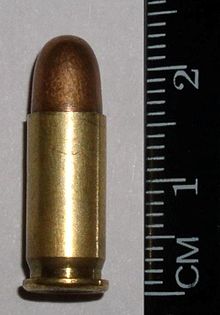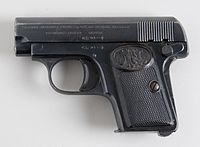.25 ACP
| .25 ACP | ||||||||||||||||||||||||
|---|---|---|---|---|---|---|---|---|---|---|---|---|---|---|---|---|---|---|---|---|---|---|---|---|
 .25 ACP cartridge with scale | ||||||||||||||||||||||||
| Type | Pistol | |||||||||||||||||||||||
| Place of origin | United States and Belgium | |||||||||||||||||||||||
| Production history | ||||||||||||||||||||||||
| Designer | John Browning | |||||||||||||||||||||||
| Designed | 1905 | |||||||||||||||||||||||
| Produced | 1905–present | |||||||||||||||||||||||
| Specifications | ||||||||||||||||||||||||
| Case type | Semi-rimmed, straight | |||||||||||||||||||||||
| Bullet diameter | .2512 in (6.38 mm) | |||||||||||||||||||||||
| Land diameter | .2429 in (6.17 mm) | |||||||||||||||||||||||
| Neck diameter | .276 in (7.0 mm) | |||||||||||||||||||||||
| Base diameter | .278 in (7.1 mm) | |||||||||||||||||||||||
| Rim diameter | .302 in (7.7 mm) | |||||||||||||||||||||||
| Rim thickness | .043 in (1.1 mm) | |||||||||||||||||||||||
| Case length | .615 in (15.6 mm) | |||||||||||||||||||||||
| Overall length | .910 in (23.1 mm) | |||||||||||||||||||||||
| Rifling twist | 1:16 | |||||||||||||||||||||||
| Primer type | Small pistol | |||||||||||||||||||||||
| Maximum pressure | 25,000 psi (170 MPa) | |||||||||||||||||||||||
| Maximum CUP | 25,000[1] CUP | |||||||||||||||||||||||
| Ballistic performance | ||||||||||||||||||||||||
| ||||||||||||||||||||||||
| Test barrel length: 2" Source(s): Buffalo Bore[2] Ballistics 101[3] | ||||||||||||||||||||||||
The .25 ACP (Automatic Colt Pistol), also known as the .25 Auto, .25 Automatic, or 6.35×16mmSR) is a semi-rimmed, straight-walled centerfire pistol cartridge introduced by John Browning in 1905 alongside the Fabrique Nationale M1905 pistol.
Design and history
[edit]The .25 ACP was designed because .25-caliber was the smallest John Browning could go while still retaining a centerfire primer pocket, which would be more reliable for self-defense than rimfire primers. As such, the .25 ACP allows for a very compact and lightweight gun, usually a semi-automatic pocket pistol.[4] The .25 ACP was hugely popular after its introduction, with many millions of pocket .25 "mouse guns" being offered on the market.
Following the Gun Control Act of 1968, most foreign .25 pistols were too small to be imported, however some domestic manufacturers continued to build guns in the caliber. No new .25 ACP pocket pistols have been developed in well over a decade, and it is unlikely that this will change anytime soon. The most common pocket pistols in the United States today are in .22 LR, .380 ACP or 9x19mm.[5]
The cartridge is of semi-rimmed design meaning that the rim protrudes slightly beyond the diameter of the base of the cartridge so the cartridge can headspace on the rim.[6] This semi-rimmed design allows for it to be used in revolvers. Although rare, .25 ACP revolvers were produced in the early twentieth century by Belgian, French, and German gunmakers such as Adolph Frank and Decker.[7] In the late twentieth century, Bowen Classic Arms produced a custom Smith & Wesson revolver in .25 ACP.[8]
Performance
[edit]The .25 ACP is viewed by some, including Gun Digest magazine, as a solid choice for personal defense handguns due to its small size, low recoil, centerfire primer and effective penetration.[9][10][11][12] Because of the delicate nature of the majority of .25-caliber automatics, the vast majority of commercial .25 ACP loads are not loaded as powerfully as they could be. However, more modern ammunition offerings from manufacturers such as Buffalo Bore hard cast lead, Federal "Punch" and Hornady Critical Defense are designed to be closer to the cartridge's full potential. Some more powerful loadings of the .25 ACP can even get close to .32 ACP territory.[13][14][15]
The .25 is viewed by others as inadequate for personal defense. Self-defense instructor Greg Ellifritz conducted a study using statistics from almost 1,800 real-world shootings. Of the 68 people shot with a .25 ACP, 35% of them were not incapacitated. 25% of the hits were fatal, one-shot stop was 30%, and 49% were incapacitated by one shot. The .380 ACP, on the other hand, left 16% of people shot not incapacitated. This was a 30% increase from that of the .25 ACP. Ellifritz stated: "I would skip carrying the "mouse gun" .22s, .25s and .32s." However, he also pointed out that shot placement is more important than caliber (a common argument from .25 users) and concluded his review by stating: "caliber really isn't all that important."[16] Other critics of the .25 ACP have pointed out that the round has trouble penetrating through bone and typically does not have enough energy to ensure the reliable expansion of hollow-point projectiles, and that even if the projectiles do expand, that results in a decrease of penetration.[17][18]
However, urban legends about the .25 ACP's inadequacy (such as claims that a .25 will bounce off a skull or be stopped by thick clothing)[19] are inconsistent with the cartridge's historically proven track record. Vasily Blokhin, Joseph Stalin's chief executioner, killed 7,000 people in the Katyn massacre using only a Walther Model 2 pocket pistol chambered in .25 ACP.[20][21] The reputation of the .25 ACP has long suffered from the cartridge only being offered in low-capacity pocket pistols with 2-inch barrels. This short barrel length limits the velocity and energy that a .25 can offer and contributes to the myth that the .25 ACP is less powerful than the .22 Long Rifle. The .22 LR is a rifle cartridge and, as such, is typically tested in rifle-length barrels, which is why the .22 LR appears to be more powerful than the .25 ACP. In reality, the .25 ACP tends to perform better than the .22 LR in pocket pistols, and the maximum pressure of the .25 is higher than the .22.[22][23][24] In an 18-inch barrel, a .25 ACP performs similarly to a .22 LR, with a 50 grain projectile traveling at about 1000 feet per second and producing in excess of 100 foot-pounds of energy.[25][26]
-
FN 1905/6
-
Modern jacketed hollow point loads for 6.35mm/.25 cal.
-
The Walther Model 9 pistol uses 6.35mm
-
Raven MP-25 .25 ACP chrome with faux mother of pearl grips and push up safety
-
Colt Model 1908 Vest Pocket used .25 ACP
See also
[edit]- 6 mm caliber – Firearm cartridge classification
- Table of handgun and rifle cartridges
References
[edit]- ^ Saami pressures. (n.d.). Retrieved May 3, 2023, from https://leverguns.com/articles/saami_pressures.htm
- ^ https://www.buffalobore.com/index.php?l=product_detail&p=605
- ^ http://www.ballistics101.com/25_acp.php
- ^ https://www.guns.com/news/2024/03/28/25-acp-auto-mouse-gun-caliber-bullet-browning-history/
- ^ "All You Need To Know About the 25 ACP". Retrieved 2024-07-31.
- ^ *Wilson, R. K. Textbook of Automatic Pistols. Plantersville, SC: Small Arms Technical Publishing Company, 1943. p. 258. ISBN 978-0-935632-89-7.
- ^ Hogg, Ian; Walter, John (2004-08-29). Pistols of the World. David & Charles. ISBN 0873494601.
- ^ Bowen, Hamilton. The Custom Revolver. Privately printed, 2001. ISBN 978-0-9713366-0-5.
- ^ Jerry Ahern (2010), Gun Digest Buyer's Guide to Concealed-Carry Handguns, Gun Digest Books, pp. 19–20, ISBN 978-1-4402-1383-0
- ^ Cold Steel (2016-08-25). Lynn Thompson talks about the effectiveness of 25 ACP. Retrieved 2024-07-31 – via YouTube.
- ^ Borisenko, Adam (2021-08-10). ".25 ACP: The Best Cartridge For Really Little Guns". Gun Digest. Retrieved 2024-07-31.
- ^ Esson, Roger (2023-03-17). "Is.25 ACP Any Good?". True Shot Ammo. Retrieved 2024-07-31.
- ^ K, Zac (2024-06-17). "Federal Punch Self-Defense Ammo Has New .25 ACP Option". thefirearmblog.com. Retrieved 2024-07-31.
- ^ "Tested: Buffalo Bore 25 ACP 60 Grain Hard Cast Ammunition". Retrieved 2024-07-31.
- ^ "25 Auto 35 gr FTX® Critical Defense®". Hornady Manufacturing, Inc. Retrieved 2024-07-31.
- ^ https://www.buckeyefirearms.org/alternate-look-handgun-stopping-power
- ^ https://blog.cheaperthandirt.com/rise-fall-25-acp/
- ^ https://gunmagwarehouse.com/blog/ammo-test-hornady-critical-defense-25-acp/
- ^ Lucky Gunner Ammo (2018-10-30). Is .25 ACP Literally the Worst Self-Defense Cartridge?. Retrieved 2024-08-03 – via YouTube.
- ^ Roman Brackman (1 May 2003). The Secret File of Joseph Stalin: A Hidden Life. Taylor & Francis. pp. 287–. ISBN 978-0-7146-8402-4. Retrieved 29 April 2012.
- ^ Rayfield 2005, p. 488.
- ^ Brandon (2021-11-17). "22LR vs 25 ACP - Pocket Pistol Caliber Comparison". The Lodge at AmmoToGo.com. Retrieved 2024-07-31.
- ^ ".25 ACP & .22LR: Comparing Pocket Pistol Calibers For Concealed Carry". nightgalaxy.com. Retrieved 2024-07-31.
- ^ ".25 ACP & .22LR: Comparing Pocket Pistol Calibers For Concealed Carry". nightgalaxy.com. Retrieved 2024-07-31.
- ^ "BBTI - Ballistics by the Inch :: .25 Auto Results". ballisticsbytheinch.com. Retrieved 2024-07-31.
- ^ "Ballistics by the inch". ballisticsbytheinch.com. Retrieved 2024-07-31.






